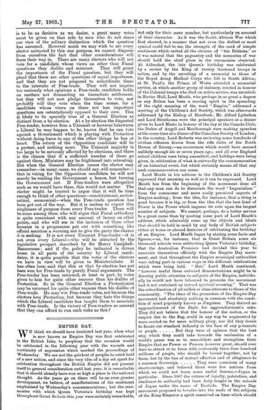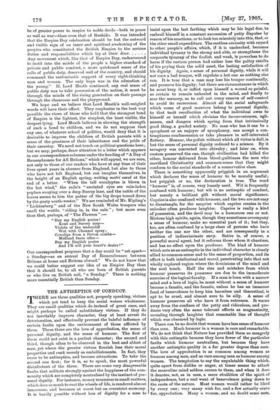not only for their mere number, but particularly on account
of their character. As it was the South African War which first showed, in a manner that not even the dullest or most cynical could fail to see, the strength of the cord of simple sentiment which united all the citizens of "the Britains," so it was natural that the pageantry and the memories of war should hold the chief place in the ceremonies observed. At Aldershot, the late Queen's birthday was celebrated by a review by the King of twenty thousand troops in action, and by the unveiling of a memorial to those of the Royal Army Medical Corps who fell in South Africa; at St. Paul's, the Prince of Wales attended a memorial service, at which another group of statuary, erected in honour of the Colonial troops who died on active service, was unveiled; in Exeter Hall, Lord Meath, who perhaps in as great a degree as any Briton has been a moving spirit in the spreading of the right meaning of the word "Empire," addressed a meeting of the Children's Aid Society, which was afterwards addressed by the Bishop of Hereford; Mr. Alfred Lyttelton and Lord Strathcona were the principal speakers at a dinner given to Lord Minto in honour of the day at the Canada Club; the Dukes of Argyll and Marlborough were making speeches at the same time at a dinner of the Canadian Society of London; in the country, Lord Roberts was reviewing some hundreds of civilian riflemen drawn from the rifle clubs of the North Downs of Surrey,—an occurrence which would have seemed unlikely enough six or seven years ago; and all over England school children were being assembled, and holidays were being given, in celebration of what is outwardly the commemoration of an historical event, but which certainly means all that any such commemoration can mean.
Lord Meath in his address to the Children's Aid Society expressed that meaning as well as it can be expressed. Lord Meath has from the beginning of the movement done all that any man can do to dissociate the word " Imperialism " from the commoner and more easily perceived aspects of Empire-making ; from the idea, for instance, that a thing is good because it is big, or from the idea that the best kind of Power is the Power which imposes ita rule upon the largest number of subjects. We cannot, perhaps, do a better service to a great cause than by quoting some part of Lord Meath's address, which admirably sums up the objects and ideals that should be held in mind by any body of British subjects either at home or abroad desirous of celebrating the birthday of an Empire. Lord Meath began by stating some facts and figures,—as, for instance, that in Great Britain some six thousand schools were celebrating Queen Victoria's birthday, that the Australian Premiers had decided this year to associate themselves officially with the Empire Day move- ment, and that throughout the Empire municipal authorities were taking part in various ways in the different celebrations which were being held. "But," Lord Meath continued, "however useful these outward demonstrations might be in drawing public attention to subjects of the Empire, individu- ally he would not have laboured to promote the movement had it not contained an inward spiritual meaning." That was the subordination of all selfish or class interests to those of the community. "The ideas of the promoters of the Empire Day movement had absolutely nothing in common with the condi- tion of mind popularly known as Jingoism. They desired no aggrandisement of the State for aggrandisement's sake. They did not believe that the honour of the nation, or the respect due to the flag, could in any way be augmented by wars carried on for mere military glory, nor did they desire to flaunt our standard defiantly in the face of any potentate
or people But they were of opinion that the best step which they could take towards the realisation of a world's peace was so to consolidate and strengthen their Empire that no Power or Powers, however great, should ever dare to attack or to treat with contumely these four hundred millions of people, who should be bound together, not by force, but by the ties of mutual affection and of allegiance to
a common Sovereign They were conscious of many shortcomings, and believed there were few nations from which we could not learn some useful lessons,—Japan in particular. Since 1867 the virtues of loyalty, patriotism, and obedience to authority had been daily taught in the schools of Japan under the name of Bushido. The Empire Day movement proposed to breathe into the souls of the subjects of the King-Emperor a spirit conceived on lines which should
be of greater power to inspire to noble deeds—both in peace as well as war—than even that of Bushido. It was intended that the Empire Day celebration should be but the outward and visible sign of an inner and spiritual awakening of the peoples who constituted the British Empire to the serious duties and responsibilities which lay at their door Any movement which, like that of Empire Day, endeavoured to instil into the minds of the people a higher standard of private and public conduct, a more quickened sense of the calls of public duty, deserved well of the country, and should command the enthusiastic support of every right-thinking man and woman. The only hope was in the education of the young." If, Lord Meath continued, any real sense of public duty was to take possession of the nation, it mud be through the minds of the rising generation on their passage through the classroom and the playground.
We hope and we believe that Lord Meath's well-weighed words will have their effect. They emphasise in the best way possible the views of those who hold that the strongest bond of Empire is the lightest, the simplest, the least visible, the deepest-lying. Lord Meath believes in showing the strength of such a bond to children, and we do not suppose that any one, of whatever school of politics, would deny that it is desirable to impress the children of British parents with a sense of the greatness of their inheritance and the pride of their ancestry. We need not touch on political questions here; but we may, perhaps, draw attention to a letter which appears in our correspondence columns under the heading of "A Day of Remembrance for All Britons," which will appeal, we are sure, not only to those of our readers who have at any time of their lives spent years in absence from England, but also to those who have not left England, but can imagine themselves, in
the height of an English spring, writing matri maul at the end of a letter. "When the tall eucalyptus is blown in the hot wind," the exile's "anointed eyes see rain-laden poplars swaying over a deep Surrey lane, and the rattle of the leaves seems to him the patter of the big drops tossed down by the gusty south-wester." We are reminded of Mr. Kipling's " Lichtenberg " and of the New South• Wales troopers who smell the wattle, "riding in, in the rain " ; but more even than that, perhaps, of "The Flowers"
Buy my English posies !
Kent and Surrey may—
Violets of the undercliff Wet with Channel spray;
Cowslips from a Devon combo— Midland furze afire—
Buy my English posies And I'll sell your heart's desire!"
Our correspondent proposes that a day could be "set apart— a Sunday—as an annual Day of Remembrance between Britons at home and Britons abroad." We do not know that we could better suggest our idea of an Empire Day than • that it should be, to all who are born of British parents or who live on British soil, "a Sunday." There is nothing more essentially British than Sunday.







































 Previous page
Previous page